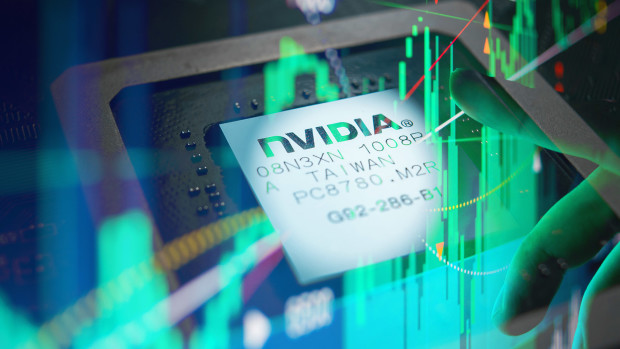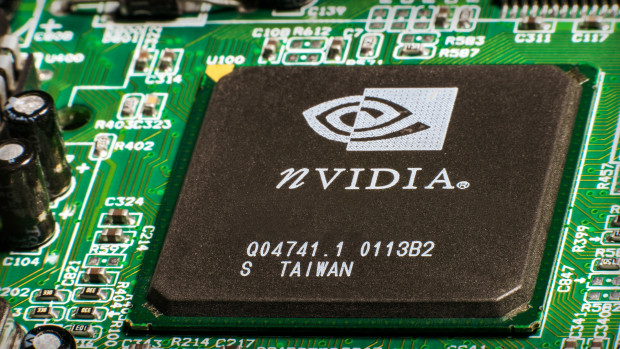
Nvidia (NVDA) -) is best known for high-performance graphics chips in video gaming and cryptocurrency mining. However, its leadership in those areas isn't behind its skyrocketing share price this year.
Instead, Nvidia's surging stock price directly results from a near-monopoly in producing next-generation chips and software necessary to train and operate artificial intelligence programs, including large language models.
The company's pole position in AI chip production recently led technology analyst Dan Ives to dub it "the Godfather of AI."
Ives isn't alone in expecting big things for the company due to rising demand for Nvidia's H100 chips, which can cost upwards of $40,000 apiece. A slate of Wall Street analysts recently adjusted their expectations ahead of Nvidia's quarterly earnings report on August 23.

Shutterstock
Nvidia enjoys a gold rush of AI demand
The launch of ChatGPT last December was so successful that it caused a gold rush of interest in AI applications.
Millions have used ChatGPT to improve search and create more meaningful content. As a result, Microsoft (MSFT) -) incorporated the LLM into its Bing search engine earlier this year, prompting Google parent Alphabet (GOOGL) -) to launch its own LLM, Bard.
DON'T MISS: Nvidia analyst says the AI chipmaker has a 'real shot' to top earlier highs
They're far from alone in seeking to exploit AI's benefits. JP Morgan (JPM) -) is reportedly working on its own LLM and enterprise, and government demand is so high for AI app development that Palantir (PLTR) -) says over 100 customers are already using its Foundry AI to develop AI solutions.
The wave of interest in AI is a boon to Nvidia, because traditional CPU-based servers deployed in cloud and enterprise networks aren't ideally suited to the performance requirements necessary for training and operating AI programs. Instead, Nvidia's H100 is the solution offering the processing power and low energy use that's key to AI research.
As a result, investment in H100 by hyper-scale cloud providers such as Microsoft, Alphabet, and Amazon (AMZN) -) will likely allow Nvidia to report robust sales and profit for the second quarter.
It may also allow billionaire CEO Jensen Huang to once again issue surprisingly good forward guidance for the rest of the year.
Nvidia's results could impress yet again
Nvidia's shareholders witnessed what better-than-expected sales, profit, and guidance can do to Nvidia's share price. Last quarter, strong sales and quarterly sales guidance of $11.1 billion -- miles above Wall Street's $7.1 billion estimates -- has caused shares to surge 54%, lifting Nvidia's year-to-date return to 221%.
More Business of AI:
- Here's the startup that could win Bill Gates' AI race
- Meet your new executive assistant, a powerful AI named atlas
- The company behind ChatGPT is now facing a massive lawsuit
Topping that will be tough. But strong orders could allow the company to beat and guide higher again. For example, the Financial Times recently reported that Saudi Arabia has ordered over 3,000 H100 chips, and the UAE has similarly purchased thousands of chips to develop its own LLM, Falcon.
Optimism tied to orders like those have analysts ramping up their earnings outlooks. Over the past 90 days, the consensus Wall Street quarterly estimate has risen to $2.07 from $1.06, and the full-year estimate has climbed to $8.08 from $4.59.
That's impressive, yet it still may underappreciate Nvidia's opportunity.
"We expect a bullish outlook from Nvidia that should be the fuel in the engine to continue this tech rally into the rest of the year," wrote Wedbush's Ives in a note to its clients.
Over at KeyBanc, analyst John Vinh said Nvidia's unmatched and likely to exceed estimates because it's "uniquely positioned" with "limited competitive risks."
Meanwhile, Frank Lee, an analyst for HSBC, said that earnings upside into fiscal 2025 is yet to be fully priced into Nvidia's stock price.
Vinh sees Nvidia's stock heading to $620, while Lee's price target is a whopping $780.
Raymond James Srini Pajjuri has a relatively tame $500 target. He rates Nvidia a "strong buy" and recently upped his earnings per share estimates to $8.28 per share this year and $12.42 next year.
Given what these analysts are saying, Nvidia's problem from here might not be demand, but it could be supply.
Advanced Micro Devices (AMD) -) is still developing its alternative to the H100, so Nvidia's status as the sole source of these next-generation AI chips could mean it has difficulty producing its chips fast enough.
One stock we believe will win in the AI race (it's not Nvidia)







